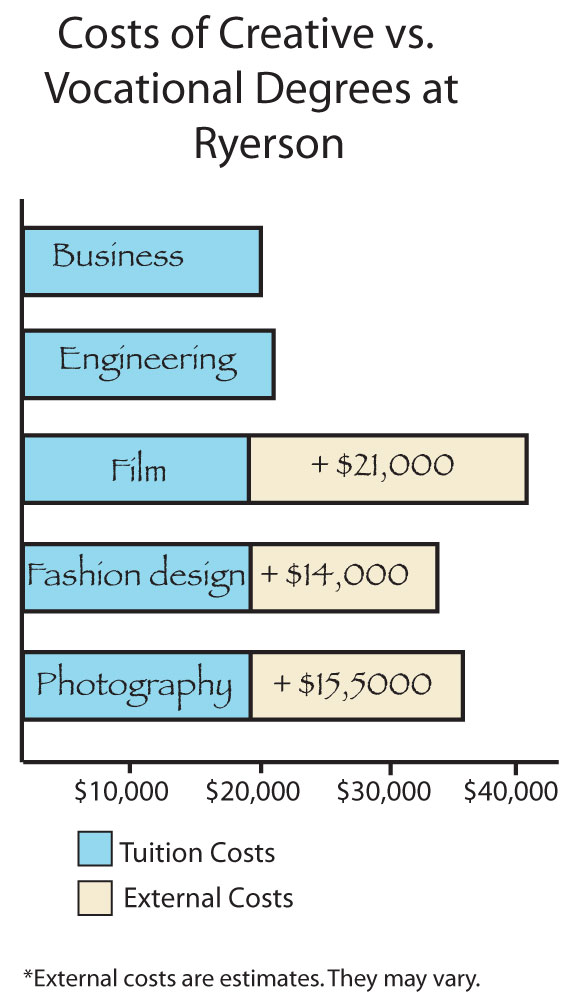By Jackie Hong
Third-year photography student Sebastien Dubois-Didcock shoots with a Canon 5D Mark II, a 21.1-megapixel stunner of a camera with a price tag to match – new, it rings in at about $3,000, the minimum a photographer who wants to go pro needs to spend on a DSLR.
Lenses aren’t cheap either, costing hundreds of dollars each. Then, there are tripods, lights, memory cards, props, even-harder to find film cameras and film. Add in printing, rental gear and a laptop, and photography students can easily spend over $20,000 over their four years at Ryerson – and that’s not including tuition.
“I feel like photography is one of the arts that has the highest cost involved,” Dubois-Didcock said.
He spends $2,000 to $5,000 a year on projects, and works two jobs to keep up with the expenses.
Photography students aren’t alone. Fashion design and film students pour hundreds of dollars into projects every semester. Each program commands roughly $6,700 in tuition every year; with additional costs, they’re easily the most expensive degrees to earn at Ryerson.
On average, photography, fashion design and film students spend $5,000, $10,000, and $12,000, respectively, in fourth year on supplies.
For other programs, fourthyears usually spend $2,000 or less.
“[Everyone’s] paying peanuts compared to us,” said third-year film student Deidter Stadnyk.
Stadnyk’s spent $3,000 this year on camera and light rentals. As well, third-year film students must produce a short film on a $4,000 budget, with the cost split between four people. Fourth-year film students don’t have a set budget for their projects and Stadnyk’s heard of a group who spent $100,000 making a film about the Holocaust.
Because of time-consuming shooting and editing, it’s hard for most film students to get jobs. Many turn to loans to stay financially afloat. In recent years, “crowdfunding” websites like Indiegogo, where people can donate towards a listed project, have become popular ways to raise money. Indiegogo can yield impressive results: last year’s top campaign, a fundraiser to buy Nikola Tesla’s lab, raised over $1.3 million. However, when it comes to student films, campaigns are rarely successful.
“Indiegogo’s more of a vehicle for friends and family, people who would already be supporting the student anyway, to donate online,” Stadnyk said. “Who’s going to randomly donate to some student film? No one.”
Arts fields are notoriously hard to find jobs in, and recent grads often struggle to pay off loans.
Ryerson photography grad Chris Dale knows this first hand. Dale currently works on a handful of freelance projects, but still lives with his parents to save money. He’s one of five people from his graduating class of 2012 still working in photography.
“If you don’t create your own opportunities, you’re fucked,” Dale said. “It’s kind of disheartening. It’s like, ‘Hey, I’m going to school to become a photographer,’ and then you realize it’s a shitty industry.”
Despite murky job prospects in the arts, fashion instructor P.Y. Chau said they’re still important.
“Look around, everything’s fashion… If people make something ugly, who’s going to buy it?” Chau said. She added that many students do arts degrees to satisfy their passions for the field.
This is the case for second-year fashion design student Jackie Evans. Living off savings and student loans, she’s spent thousands this year on fabric, sewing machine parts and essentials, like scissors, but doesn’t have any doubts about her program.
“If you want the most out of your education and the quality of your work to show, you literally need to pay the price,” Evans said. “…You need to love, live and breathe it, because it is demanding in pretty well every way you can imagine.”












Scott
Great article, thanks for posting your view.
It is an interesting experience, to graduate from a design-based program in this economy.
Only a few of the most persistent students have landed jobs in agencies, while the vast majority have switched to retail or whatever happens to be available in the marketplace.
I have decided to live it, breathe it, and keep improving at every chance that comes my way because I Love it. I Love being an independent creator and I can honestly say that the struggle is worth it.
Keep following your passion! May it renew you.
S